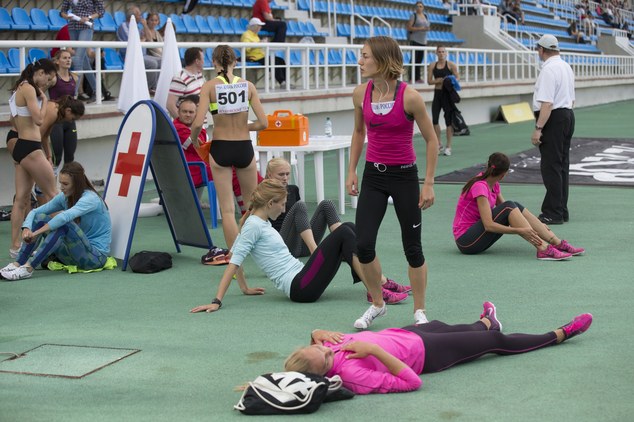Investigation into Russian doping still splits sports world

FILE – In this Thursday, July 21, 2016 file photo, Russia’s athletes rest before competing at the Russian Athletics Cup, at Zhukovsky, outside Moscow, Russia. A year on from a damning report which described widespread, systematic doping, Russian track and field is hopeful of a way back. On Nov. 9, 2015, the World Anti-Doping Agency’s independent commission unleashed a strongly worded, 323-page account of how Russian coaches and officials had colluded with athletes to use performance-enhancing drugs before and after the 2012 Olympics in London. AP
GLASGOW, Scotland — Anti-doping leaders were challenged to produce more credible evidence of Russian cheating by a leading Olympic executive on Saturday.
Leaving a meeting of the World Anti-Doping Agency executive committee, IOC representative Gian Franco Kasper dismissed the credibility of the report that detailed Russian state-sponsored doping.
Manipulation of samples at the 2014 Sochi Winter Games and cover-ups of positive tests across dozens of summer and winter Olympic sports was reported by WADA investigator Richard McLaren in July ahead of the Rio de Janeiro Games.
“I want to see the proof,” Kasper, who is also president of the skiing federation, said in Glasgow. “We cannot say it’s correct or not. He has to bring proof with names.”
Former Russian anti-doping lab director Grigory Rodchenkov told McLaren that samples of Russian athletes were passed through a concealed hole in the wall during the middle of the night at the Sochi Games, with the help of intelligence officers from the FSB, the current version of the Soviet Union’s KGB.
“You know this hole in the wall in Sochi was Hollywood for me … they had a key for the door,” Kasper said. “The KGB are so stupid they have to drill a hole in the wall? Come on.”
U.S. Anti-Doping Agency chairman Edwin Moses, the gold medal-winning and world record-setting hurdler from the 1970s and ’80s, said it was “ridiculous” for Kasper to question the investigation.
“Wave after wave of retests show that there are Russian athletes (doping),” Moses said after attending the WADA meeting with Kasper.
“You can go back one or two Olympic Games and it just seems like wave after wave of Russians are showing up (as having doped) which really cuts through the credibility of the results of those Olympic Games and the redistribution of medals. To me that’s a horrible situation.”
The latest batch of retests of samples from the 2008 Beijing Olympics saw the IOC announce on Thursday that four Russian athletes, including three medalists, tested positive for banned substances.
“The credibility of Olympic medals has diminished and that’s what the athletes are believing,” Moses said. “You have scores of athletes out there who should have won medals and now know they were right.”
That is why Moses, like WADA, wanted the entire Russian delegation banned from the Rio Games in August, a move that provoked the ire of the International Olympic Committee.
The IOC rebuffed those calls, instead allowing individual sports to rule on the eligibility of Russians.
Three months after the Rio Games, the rifts remerged in public at an Olympic gathering this week in Qatar, where the IOC questioned Craig Reedie’s WADA leadership, demanding a neutral president. Reedie is still set to be re-elected unchallenged for a second three-year term at the WADA Foundation Board meeting in his native Scotland.
“There is no point at the moment walking away from this situation when things need to get done and things get difficult,” Reedie said on Saturday. “There are people demanding improvements in process and I want to get that finished as well.”
A WADA Foundation Board meeting on Sunday will see a discussion of the WADA leadership’s push for enhanced whistleblowing mechanisms, and bid to codify a sliding scale of sanctioning powers, including fines or blanket bans on entire countries or sports for the type of widespread doping scheme it believes was run by the Russian state.
“WADA only tried it once with the Russians in Rio and the IOC said no — it’s none of their business,” Kasper said. “It has to be a neutral institution and it shouldn’t be political. … You cannot be the prosecutor and the judge yourself. It’s the basic principle of justice.”